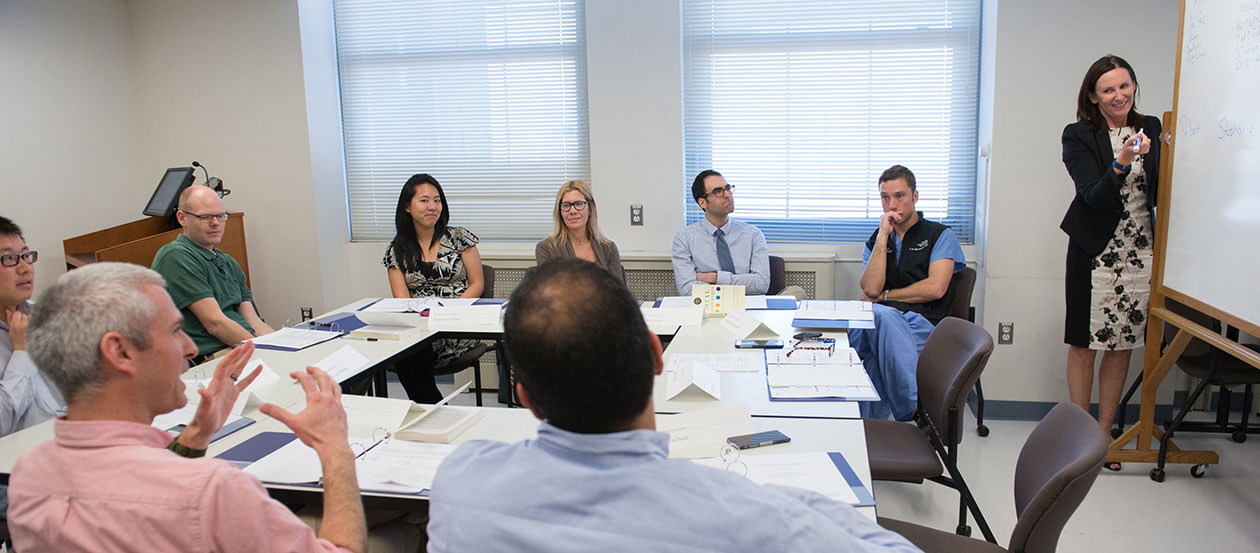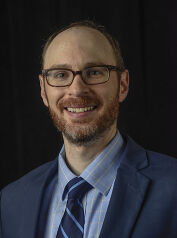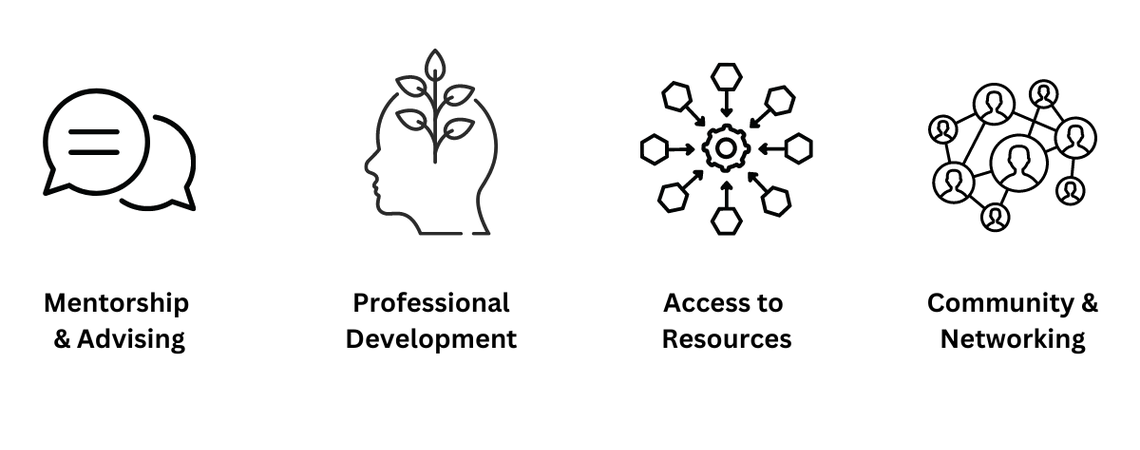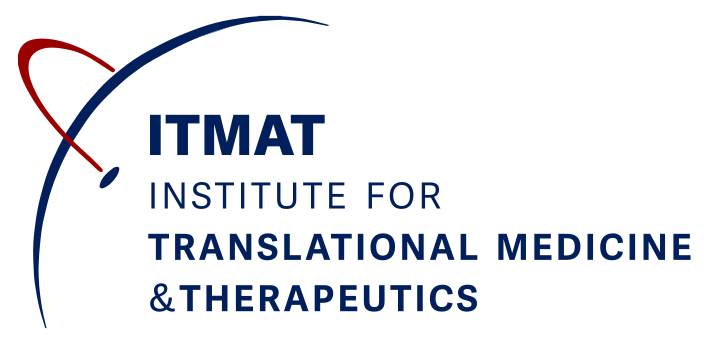Research Mentor Training at ITMAT Education

What is mentoring today? Today’s definition of mentoring extends far beyond the traditional role of academic supervisor. Presenting a wide spectrum of ever-changing expectations and responsibilities, it has come to define a dynamic and collaborative learning relationship of which—if carried out effectively—both mentor and mentee can personally and professionally prosper. But what does it require to be an effective mentor?
The Research Mentor Training program at ITMAT Education teaches mentors the key determinants for creating a culture of strong mentorship, using case scenarios to enhance mentee self-efficacy, work-life integration, and overall career satisfaction to ensure successful scholar outcomes from all individuals pursuing research.
We speak to all levels of mentoring. Are you a senior-level faculty member looking for a refresher course, or a junior faculty member in the midst of building your lab? Our training modules are available for research mentors of undergraduate and graduate students, clinical fellows, postdoctoral researchers, or junior faculty working with trainees across the medical and health sciences. Our programs recognize diversity among mentors at all career stages and address individual needs in the format of an annually scheduled cohort training or as requested custom training modules.
Our program is evidence-based. The Research Mentor Training program at ITMAT Education is based on a nationally recognized model and proven-effective curriculum developed at the Center for the Improvement of Mentored Experiences in Research (CIMER) at the University of Wisconsin-Madison. CIMER is home to the Coordination Center of the National Research Mentoring Network (NRMN), which is part of a broader NIH consortium dedicated to enhancing diversity in the biomedical research workforce through strong mentoring and other initiatives.
The benefits are clear. Learn how to establish a mentoring identity, become a more intentional mentor, and master programmatic elements of effective mentoring practices so that you and your mentees both benefit from the relationship and find personal satisfaction as well as academic success.
Format 1: Annual Research Mentor Training
The Research Mentor Training program is an annually scheduled series consisting of 3 to 4 two-hour interactive sessions designed to enhance mentoring effectiveness. This cohort-based training covers key mentoring competencies inclusive of communication style, aligning expectations, fostering independence, and promoting self-efficacy among mentees. We welcome faculty from PSOM and ITMAT-partner institutions at the Assistant Professor appointment or higher who are currently serving as research mentors and are committed to attending all sessions. Sessions take place in late winter/early spring each year. Registration opens in the fall.
As of March 2020, 142 faculty from PSOM have participated in the Research Mentor Training program. Based on cumulative feedback received from 94 faculty surveyed post training (83.9% cumulative response rate for 2012-2019 participants), 93% were very likely or likely to recommend the training to a colleague and 95% thought the training was a valuable use of their time.
Format 2: Custom Training Module
Our custom training modules offer an in-depth focus on the key elements of effective mentoring in diverse settings and at all career levels. Similar to the Annual Research Mentoring Training, mentors can learn the skills to establish an effective and mutual communication style, align mentor and mentee expectations, initiate and sustain conversations on professional goals and career development strategies, and understand the importance of ‘mentoring up’ for mentees.
Custom training may be designed as a half-day module, full-day module, or one-hour interactive presentation. Modules may be designed to target a specific audience (e.g., junior faculty) or to address a particular focus (e.g., enhancing career development of individuals from diverse backgrounds, communities, and cultures).
Custom training can be scheduled at any time.
Facilitators & Advocates of Mentor Training within PSOM
Emma Meagher, MD. Professor of Medicine and Pharmacology.
Emma Meagher, MD, Professor of Medicine and Pharmacology, is a Master Facilitator via the NIH National Research Mentor Network and conducts training and seminars at Penn, CHOP, and at institutions across the Clinical and Translational Science (CTS) community, adapting the key modules and concepts to fit the needs of groups at varying stages. Within PSOM she serves as educational lead of ITMAT, as Senior Associate Vice Provost for Human Research, and Vice Dean for Clinical Research and Chief Clinical Research Officer. An accomplished educator, Dr. Meagher received the Lindback Award, Penn’s highest honor for predoctoral teaching excellence, in 2005; the Dunning Dripps Award, Penn’s highest honor for postgraduate teaching excellence, in 2010; the AAMC Alpha Omega Alpha Distinguished Teacher Award in 2014; and the Association for Clinical and Translational Science (ACTS) Distinguished Educator Award in 2020.
Marina Cuchel, MD, PhD, MSTR. Research Associate Professor of Medicine.
Elizabeth Olson Hexner, MD, MSTR. Associate Professor of Medicine, Division of Hematology Oncology.
As an Associate Director of the Masters in Translational Research program, and course director for Cell and Gene Therapy, I have a particular interest in facilitating trainees and junior faculty to become clinical and translational scientists. An essential piece of career development is a healthy mentoring relationship; this can be developed and fostered with purposeful mentee and mentor training.
Jennifer M. Kalish, MD, PhD, MSTR. Assistant Professor of Pediatrics, Division of Human Genetics.
Participation in Research Mentor Training has helped me reflect on my mentorship style and develop new approaches to the mentor-trainee relationship. I recommend this program because it helps mentors develop a framework for mentorship.
Despina Kontos, PhD. Associate Professor of Radiology.
As junior faculty at the time, the research mentor training helped me reflect upon the kind of mentor I wanted to become so that I could motivate and guide my own mentees in an inspirational way. It also helped me develop the skills needed to achieve this goal by connecting me with a diverse group of senior mentors and other mentees in the early stages of my career. It was a superb experience altogether, and I highly recommend the program to all levels of faculty—from junior to senior—as being a good mentor is a process that continuously evolves!
Francis McGowan, Jr., MD, FAAP. Professor of Anesthesiology and Critical Care.
Pamela Weiss, MD, MSCE. Associate Professor of Pediatrics and Epidemiology.
Successful mentorship requires both an effective mentee and a skilled mentor; when this relationship is primed and fine-tuned, it can be one of the most rewarding aspects of participating in patient-oriented research. Formal mentor training will take your skillset to the next level, improve your communication skills, and help you maximize both your own and your mentees’ potential and ultimate success.
Local & National Library for Additional Mentoring Resources
Penn/CHOP Community:
- CHOP Research Institute (https://www.research.chop.edu)
- Faculty Affairs and Professional Development (FAPD) (https://www.med.upenn.edu/fapd/)
- Office of the Dean (https://www.med.upenn.edu/evpdean/leadership/)
- Office of Inclusion & Diversity (https://www.med.upenn.edu/inclusion-and-diversity/)
- Penn CME Office (https://upenn.cloud-cme.com/default.aspx)
National Community:
- National Research Mentoring Network (NRMN) (https://nrmnet.net/about-nrmn-2/)
- NIH Diversity Consortium (http://www.diversityprogramconsortium.org/)
- University of Wisconsin-Madison Research Mentoring Resources (https://mentoringresources.ictr.wisc.edu/)
Clinical Trialist Training Program

Developing the Penn Medicine Clinical Trialist Workforce
Clinical trial activity at Penn Medicine has steadily increased in volume and complexity over the past decade. While most of the growth has been evident in the realm of first/early-in-human studies we also recognize the value to trials that evaluate the implementation of treatment paradigms.
Junior faculty are increasingly interested in conducting investigator initiated clinical trials to test the effect of integrating new technologies into clinical care or to evaluate changes in clinical care that are not pursued by commercial sponsors. As an institution we recognize that design, implementation, and reporting of clinical trials is a form of science conducted in humans that requires specialized training.
Clinical Trialist Training Program
Program Overview
The objective of ITMAT Education’s Clinical Trialist Training Program is to (i) train faculty wishing to become trialists; (ii) establish a mechanism that supports clinical trialists career trajectories, and (iii) facilitate the mission of Penn Medicine to translate scientific breakthroughs and clinical trial discoveries into treatment.
We aim to meet these objectives through (i) customized curriculum in clinical & translational science, (ii) formal mentorship, (iii) facilitated access to resources that enables successful execution of a research project that involves the design, preparatory work, and conduction of a clinical trial, and (iv) a limited number of scholarships that would provide some salary support to protect a faculty member’s time to execute their research project.
The Clinical Trialist Training Program is offered preferentially to instructors and assistant professors (within their first 3 years of appointment) at Penn Medicine. However, more advanced faculty considering a pivot in their career to clinical trials will be considered. Individuals will be selected to pursue training for 2 years. CTTP participants are required to devote 25% protected time to dedicate towards the program for a period of 2 years.
Research Project
At the time of application, physicians must have, at a minimum, a partially-developed investigator-initiated clinical trial concept that can be ideally initiated within the two years of the program. Expectations include that the physician will lead the development of the design of the clinical trial and its execution as the principal investigator under the guidance of an established clinical trialist who will serve as a mentor for the duration of the program. The anticipated source of funding for the trial needs to be articulated at the time of application. Budget development and negotiation is considered an integral part of both the development of a research project and its feasibility therefore participants should be included in these conversations, if possible, in advance of and during the CTTP.
The product or output of the program is a fully developed IRB approved trial that is enrolling by the end of year one. As a requirement of successful completion of the program, the participant will be expected to prepare a manuscript for submission or a presentation at a national meeting.
Curriculum Overview
CTTP Participants pursue a customized career development plan. Pillars of the program are coursework tailored to the needs of the participant, IRB membership, and ad hoc mentorship.
Sample coursework available to participants include, but is not limited to:
- Principles of drug development
- Clinical trial design and protocol development
- Operational study management and clinical trial execution
- Regulatory principles
- Intro to Biostatistics
ITMAT Ed Faculty and Staff provide suggestions based on the specific needs of the participant. The option to advance to a more formal existing certificate or degree program are also available.
Participants are encouraged to attend the ITMAT Education Professional Skills Development Program (PSDSP). This program supports clinical and translational scientists to successfully execute research endeavors on the path to independence. Sessions are designed to advance the knowledge, skills, and attributes in key competency areas to enhance clinical investigators’ abilities to collaborate, lead, direct, network, manage up, navigate conflicts, negotiate, and more.
Participants will serve as an IRB member throughout the duration of the program and be mentored by the IRB Chair. This membership experience will expose participants to real issues, considerations, and solutions in human subject’s research and study design.
At the end of the 2-year program, participants are invited to present their research project experience, with a particular focus on hurdled encounters and how they overcame those barriers with successful strategies to past and present CTTP participants.
Mentorship
Effective mentoring requires the primary mentor dedicate substantial time to ensure personal and professional development of the mentee. We recognize the importance of strong mentoring attributes and the significant time required to mentor effectively, thus experienced clinical trialists will serve in this role. The Mentor-Mentee Compact will be available to all mentors and mentees to initiate discussion and clarify expectations and responsibilities of both parties. A member of the ITMAT Ed faculty will be assigned to provide programmatic mentorship throughout the duration of the program.
Eligibility Criteria
- Applicants must have an MD degree
- Applicants must be a dedicated clinician and committed to a career path in developing and implementing investigator initiated clinical trials
- Preference is given to Instructors and Assistant Professors (within their first three years of appointment)
- However, more advanced faculty considering a pivot in their career to clinical trials will be considered
- Faculty in the AC, CE, and Tenure Track are eligible to apply
- Preferential consideration is given to faculty in the AC track
Applicants should not have concurrent sources of salary support for research time
Mentorship
Applicants to the Clinical Trialist Training Program may apply in tandem to the Clinical Trials Scholarship, which provides physicians up to 25% protected time to dedicate towards the program for 2 years. If applying for the scholarship, applicants should not have concurrent sources of salary support for research time.
The Clinical Trials Scholarship is part of the suite of ITMAT Ed Career Development Awards.
Application Requirements & Application Access Instructions
Application Requirements
Only one application is required for both the Clinical Trialist Training Program and Scholarship.
The application includes the following required items:
1. Application form which includes:
- Curriculum Vitae
- Personal Statement:
- A one-page description of the applicant’s academic track, career goals, and how the program will support these goals
- Other Support (Funding Support for Applicant):
- A description of how the applicant’s time will be protected, or a request to be considered for the Clinical Trials Scholarship (indicate percent effort being requested –maximum amount available is 25% effort based on NIH funding maximums). If applying for the scholarship, applicants should not have concurrent sources of salary support for research time.
- Research Statement: 2-3-page description of proposed trial or submit the IIT Protocol if it is available.
2. Letter of Support from Primary Mentor
- The mentor’s letter of support should comment on the following:
- Commitment to mentor the candidate
- Suitability of the candidate for the program
- Assessment of the value of the research project and its feasibility
- Mentor’s prior experience mentoring clinical researchers
- Candidate’s access to clinical research support staff
- Availability of funding for study execution
- Presence of unresolved contractual obligations that need to be addressed
3. Letter of Support from Departmental Chair (Applicants should request their Department Chair email an attached letter of support to ITMAT Education at jbgerman@upenn.edu)
- Commitment of the division/department to the candidate’s research direction and career goals
- Guarantee of 25% protected time for the candidate to conduct clinical trials
- Availability of resources for the candidate
Applicants, please add headers with your name to the applicable documents.
To submit an online application, you will need to create a CollegeNet account and follow the steps below
- Create a CollegeNet account. After logging into CollegeNet, select “Online Application”.
- Enter your Personal Information. Save and continue to Program Information.
- Choose “Perelman School of Medicine – Masters and Certificate Programs”
- Search and select “ITMAT Clinical Trials Fellowship” (note that it will appear under this name, not “Clinical Trialist Training Program,” due to a recent name change)
- Select “Fall 2023” term.
- You can enter information in stages, at your own pace, and access the application any number of times until submission.
- You will enter the recommender information into the system which will send the letter request to your primary mentor and department chair.
- Once the application has been fully submitted, you can return to your account to check the status of your application and letters from your recommender and department chair.
Application Support
ITMAT Education Faculty and Administration encourage interested applicants to contact us. Jessica German and Dr. Marina Cuchel will reach out to set up a time to discuss your interest in the CTTP. Through this initial consult, program faculty and/or staff can gain understanding to how this program may best align with your career goals, connect interested applicants to current students or past participants, answer questions about the application process, provide feedback on project proposals or mentorship.
Frequently Asked Questions (FAQ's)
- I do not currently work at Penn. Am I eligible for the program and/or scholarship?
- Clinical Trialist Training Program participants must be employed at Penn upon entering the program.
- What is the application timeline?
- Applications are accepted on a rolling basis.
- Are all academic tracks able to apply for this program?
- Tenure, CE, and AC track faculty are encouraged to apply.
- Are PhDs eligible for this program?
- This program is geared toward physicians.
- Are more advanced faculty eligible to apply?
- Advanced faculty considering a pivot in their career to clinical trials will be considered.
- Can I apply for this program if I am not seeking financial support?
- We encourage you to apply. Please indicate your funding sources in your application and describe your interests in this program.
- Can I apply for this program if I am seeking partial or up to 25% protected time to conduct clinical trials?
- We encourage you to apply. Please indicate your percent effort being requested and describe your interests in this program.
- What is the timeline from application to selection to start-date?
- Start date would be a term later.
Participant Spotlight
CTTP Participant Spotlight
Participants
 Archna Bajaj, MD, MSCE
Archna Bajaj, MD, MSCE
Clinical Trialist Training Program, 2018-2020
Current Position: Assistant Professor, Department of Medicine, Division of Translational Medicine and Human Genetics, University of Pennsylvania Perelman School of Medicine
Archna applied to the program because she was interested in receiving more formal training to become a clinical trialist, and for the protected time it offered her to work on an early phase trial to get an in-depth experience in trial design and development. She is working on development of a phase I first-in-human clinical trial for a gene therapy product for LCAT deficiency — a very rare genetic disorder of cholesterol metabolism with high morbidity/mortality from early and progressive renal sequelae of the disease. She is working on the pre-IND submission, including development of the trial design which will involve using a non-traditional adaptive design given the rarity of the disorder. She has also found the fellowship to “be helpful for connecting with other fellows who share an interest in clinical trials and share experiences on trial development and the resources and/or educational opportunities we’ve each found to be useful.”
Check out Archna’s publications on Pub Med.
 David Fajgenbaum, MD, MBA, MSc
David Fajgenbaum, MD, MBA, MSc
Clinical Trialist Training Program, 2018-2020
Current Position: Assistant Professor, Department of Medicine, Division of Translational Medicine and Human Genetics, University of Pennsylvania Perelman School of Medicine
David applied to the program because he identified a need for mentorship and protected time to effectively run a clinical trial. Data that he generated using orthogonal basic and translational research techniques suggested that there was increased mammalian Target of Rapamycin (mTOR) signaling in idiopathic multicentric Castleman disease (iMCD) and that it may be a critical therapeutic target for the disease. Off- label use of an mTOR inhibitor in iMCD suggested that it may be a safe and effective approach for treatment-refractory patients. David is currently testing this hypothesis in a clinical trial with support from the Clinical Trials Fellowship. The program “has provided me with critical mentorship to prepare for launching my first interventional clinical trial as a PI. I have received targeted feedback on launch plans and enrollment strategies.” David was able to take a bioinformatics course during his protected time, that the fellowship provided. He has also “enjoyed getting to know and connect with other ITMAT Clinical Trials Fellows.”
Check out David’s publications on Pub Med.
 Ethan Weinberg, MD, MS
Ethan Weinberg, MD, MS
Clinical Trialist Training Program, 2018-2020
Current Position: Assistant Professor in Clinical Medicine, Department of Medicine, Division of Gastroenterology and Hepatology, University of Pennsylvania Perelman School of Medicine
Ethan is interested in being a site PI for industry-sponsored trials and composing single-center and multi-center investigator-initiated clinical trials. Since beginning the Clinical Trials Fellowship, he has opened a therapeutic trial for the use of ursodeoxycholic acid in hepatic sarcoid (https://clinicaltrials.gov/ct2/show/NCT03602976) and successfully recruited subjects into the study. He is taking one graduate level course per semester on clinical trials and has been able to publish some of his work from these classes. The Clinical Trialist Training Program has provided the resources and salary-support for him to pursue an investigator-initiated clinical trial into a rare disease, hepatic sarcoid, that is understudied. “This work and my studies would not have been possible without the support of this program.”
Check out Ethan’s publications on Pub Med.
 Gaia Coppock, MD
Gaia Coppock, MD
Clinical Trialist Training Program, 2020-2022
Current Position: Assistant Professor; Renal, Electrolyte, and Hypertension Division, University of Pennsylvania Perelman School of Medicine
Gaia applied to the program because she has a background in basic science immunology research and wanted to find an avenue to use that knowledge in more of a clinical space. Her formal project in the Clinical Trialist Training Program was working on the TRIDENT2.0 study, which is looking at the impact on gene expression in people with diabetic kidney disease who are being treated with SGLT2 inhibitors. During her program, she worked on the IRB proposal, CRFs, and MOP. She shared “being a [CTTP participant] during the height of the COVID pandemic taught me some important lessons about navigating trial development with limited resources.” She took classes during the program to understand elements of study design like designing a budget, which she thought were incredibly useful when seeing budget negotiations happen in real time. As she’s met people in the clinical trials space, they’ve shared with her they had to learn on the job. She shared “while hands on experience is an important part of every training program, the CTTP allowed me the chance to develop a strong foundation through coursework and mentorship that broke down many of the barriers that I otherwise would have faced in trying to learn how to navigate this process. I am very grateful for the mentorship and structure that is provided during that time so that I could grow into my current role.”
Check out Gaia’s publications on PubMed.
Do you want to learn more about their experience?
The participants would be happy to meet with those interested in learning more about their experience in the program. Contact Jessica German to be connected
Educational Resources
- Coursework
- ITMAT Education Courses
- MTR/REG 5100 provides sessions on budgeting and negotiation.
- UPenn Course Catalog
- Ethics and Trial Design
- ITMAT Education Courses
- Professional Development
- ITMAT Education Professional Skills Development Program (PSDP)
Jeanne Clery Disclosure of Campus Security Policy and Campus Crime Statistics Act
The federal Jeanne Clery Disclosure of Campus Security Policy and Campus Crime Statistics Act, as amended, requires colleges and universities to provide information related to security policies and procedures and specific statistics for criminal incidents, arrests, and disciplinary referrals to students and employees, and to make the information and statistics available to prospective students and employees upon request. The Campus SAVE Act of 2013 expanded these requirements to include information on and resources related to crimes of interpersonal violence, including dating violence, domestic violence, stalking and sexual assault. Federal law also requires institutions with on-campus housing to share an annual fire report with the campus community.
In addition, the Uniform Crime Reporting Act requires Pennsylvania colleges and universities to provide information related to security policies and procedures to students, employees and applicants; to provide certain crime statistics to students and employees; and to make those statistics available to applicants and prospective employees upon request.
To review the University’s most recent annual report containing this information, please visit: https://www.publicsafety.upenn.edu/clery/annual-security-fire-safety-report/ or http://www.upenn.edu/almanac/crimes-index.html.
You may request a paper copy of the report by calling the Office of the Vice President for Public Safety and Superintendent of Penn Police at 215-898-7515 or by emailing vp@publicsafety.upenn.edu.
Non-discrimination Policy
The University of Pennsylvania values diversity and seeks talented students, faculty and staff from diverse backgrounds. The University of Pennsylvania does not discriminate on the basis of race, color, sex, sexual orientation, gender identity, religion, creed, national or ethnic origin, citizenship status, age, disability, veteran status or any other legally protected class status in the administration of its admissions, financial aid, educational or athletic programs, or other University-administered programs or in its employment practices.
Questions or complaints regarding this policy should be directed to the Executive Director of the Office of Affirmative Action and Equal Opportunity Programs, Franklin Building, Suite 421, 3451 Walnut Street, Philadelphia, PA 19104-6205; or (215) 898-6993.
Leadership & Administration
Emma A. Meagher, MD | ITMAT Ed Program Director | emma@upenn.edu
Marina Cuchel, MD, PhD | CTR Program Director | mcuchel@pennmedicine.upenn.edu
Jessica German, MSEd, | ITMAT Ed Associate Director and Admin Lead CTR | jbgerman@upenn.edu
KL2 Program
Join the KL2 program to advance your career development in a peer community through mentorship, personalized education, and access to resources designed for busy scientists. Leveraging ITMAT Ed’s experience in clinical and translational training, the Penn KL2 Program is designed to nurture you towards research independence by helping you:
- become adept at the conduct of clinical and translational science, and
- navigate the early faculty appointment period
To do this, the KL2 program focuses on four main areas:

Program Goal:
Upon completion of the program, you will have mastered the CTS core competencies and achieved objective measures of success which include publications in peer reviewed journals, obtained an individual mentored career development award or independent grant funding, and continued substantial engagement in clinical and translational science.
Program Components
Mentorship & Advising
Research Mentor(s): KL2 scholars identify their research mentor(s) prior to applying to the program. The program advises on aligning mentor-mentee expectations and communication skills.
KL2 Advisory Committee: Following appointment to the grant, KL2 scholars identify an advisory committee which will provide scientific oversight and career advising, independent of their scientific mentors. This committee will include 3 faculty members, including the KL2 Program Director and will meet with the scholar and their mentor(s) every 6 months.
Learning Plan & Professional Development
Individual Development Plan: As a part of the KL2 application, scholars articulate a learning plan. Following appointment to the grant, scholars begin the process of bringing precision to their learning plan by formulating an individual development plan (IDP) that will extend for the duration of time in the KL2 program. Scholars will review their IDP with their mentors and the KL2 program director at inception and 6 monthly intervals thereafter throughout the program.
Responsible and Ethical Conduct of Research: All KL2 scholars will complete RCR training and then engage in directed experience in evaluating ethical principles through IRB membership for a minimum of 6 months.
Grantsmanship: KL2 scholars will enroll in either MTR 6060 for K Award applications or MTR 6230 for R01 applications. Both focus on specific aims review, creating a budget, grants management, and peer to peer grant review.
Symposia: As part of the learning plan, scholars will attend the ITMAT Ed Junior Investigator Symposium and the national Translational Science Meeting.
Professional Development Series: KL2 scholars will participate in a bi-weekly professional development series. Some topics are designed solely for KL2 scholars and some are combined with others in the ITMAT Ed learning community. Examples of topics include:
| KL2 Topics | ITMAT Ed Topics |
| Research in Progress | Negotiation Skills |
| Communication Skills & Expectation Setting | Communicating your Science |
| Transitioning to Faculty | Engaging with Communities |
| Biomedical Librarian Support | How to Diversify a Funding Portfolio |
| Grant Mechanics Pre/Post Award | Valuing your Science – Academic/Industry Interface |
| Creating Research Budgets | Cultivating Good Research Ideas |
| Lab Team Management | Inside the NIH |
| Culturally Aware Mentoring | Emotional Intelligence/Difficult Conversations |
Additional learning plan elements available to KL2 scholars include coursework, certificates, masters degree, workshops, and externships.
Access to Resources
ITMAT Ed Grant Library: Scholars will have access to the ITMAT Ed Grant Library which includes examples of successful K submissions.
Research Navigation: With support from the Office of Clinical Research, staff with specific expertise will provide concierge service for specific aspects of KL2 research projects as required and as they are available. This includes access to tools and templates (for example, authorship agreement template and study start-up guide).
Community & Networking
We aim to create community amongst KL2 scholars through meeting regularly to discuss research in progress, providing peer review for each other’s work, and problem solving.
Within the ITMAT Ed community, KL2 scholars will serve as near-peer mentors for early career trainees and predoctoral students through the MSTR/TL1 Professional Skills Development Program.
Within the national CTSA community, KL2 scholars will participate in the visiting professorship program and attend the annual Translational Science meeting.
Clinical and Translational Science Award (CTSA)
The KL2 program enrolls those awarded with the KL2 Mentored Career Development Award. This program and award are part of the ITMAT Education portfolio of education programs and funding mechanisms supported by the CTSA. Penn is one of over 60 institutions across the nation with this award.
Grant Funding and How to Apply
The CTSA KL2 Mentored Career Development Award includes a minimum of two years of salary support commensurate with 75% effort (capped at $90,000) plus benefits, in addition to $25,000 for training and research related expenses.
For appointments beginning in July 2024, the application deadline is November 10, 2023.
Learn more from the request for applications including eligibility and the application form.
Leadership & Administration
Emma A. Meagher, MD | KL2 PI and Program Director | emma@upenn.edu
Megan Maxwell, MSW | Senior Associate Director, ITMAT Ed | mmaxwell@upenn.edu

